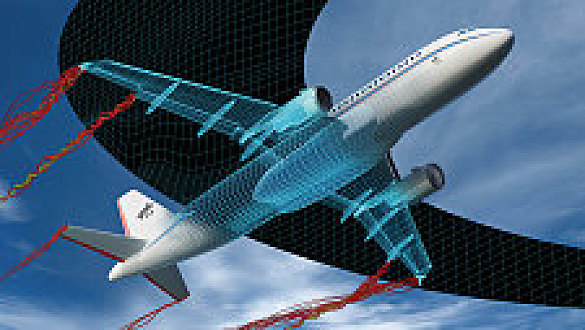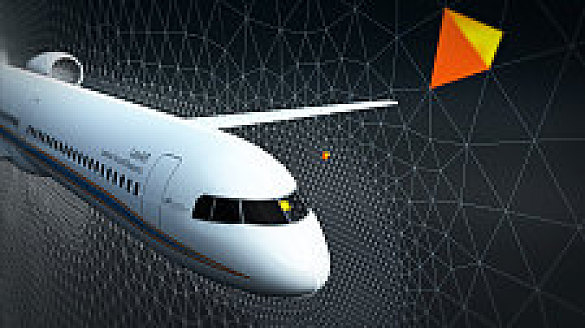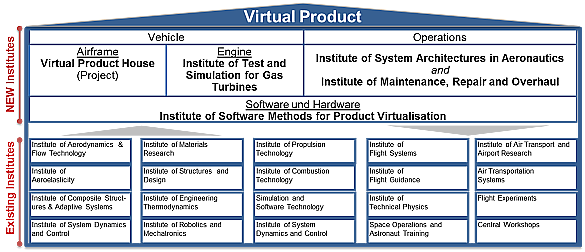Integration and test centre for the virtual approval of aircraft components

The process of digitisation is impacting the aerospace industry in Bremen. In the German Aerospace Center’s Virtual Product House (VPH), the industrial and research communities want to work together on digital aircraft development so that computer simulations can significantly accelerate the development and approval of future aircraft.
The Virtual Product House integration and test centre is to be based in the EcoMaT (Center for Eco-efficient Materials & Technologies) in the Airport City. The first stage takes the form of a launch project funded by the State of Bremen and the European Regional Development Fund (ERDF).
The launch project in the Virtual Product House is working on a multifunctional control surface for an airplane wing. The aspects of the virtual design, virtual manufacture and virtual testing through to certification of this specific component will be processed and integrated by the relevant institutes and project partners of the German Aerospace Center. The virtual integration of the various disciplines means that changes to the digital design and their effects on manufacture and testing can be analysed and optimised much more quickly.
In the long term, the VPH aims to use Common Source software architecture, i.e. a protected simulation environment, to serve as a test centre and network platform for the virtual certification of aircraft components for and in cooperation with the industrial partners.

The development, testing and manufacture of new aircraft involves extremely great risks – in terms of time, technology and finance. This is all the more so when innovative novel technologies are to be combined with future unconventional aircraft designs. Performance problems which only manifest themselves during the first test flights, delays in approvals and time-consuming production processes can result in substantial additional costs. Long product life cycles of aircraft stand in the way of dynamic product improvements and the necessary capacity of the aviation industry to innovate. Virtual processes in the field of design, development, testing and production can help reduce the technology-related risks and can speed up the introduction of new technologies in the interest of even safer, more environmentally friendly and more economic air traffic.

The German Aerospace Center (DLR), Germany’s central national research institution the aerospace sector, aims to press ahead with research and development of the Virtual Product and to establish virtual OEM capability. The aim is to develop a simulation platform which can be used to precisely analyse, design, optimise and ultimately certify aircraft configurations and their components along with all the relevant technologies and disciplinary aspects. This Virtual Product is anchored as a lead concept in the DLR’s aviation strategy.

In order to implement the DLR’s national strategy to digitise aviation, four new DLR institutes have been established in addition to the VPH. Two are based in Hamburg, the others in Dresden and Augsburg. In this context, as an important centre for the aerospace industry with industrial and SME expertise, the university and the EcoMaT, Bremen offers an outstanding situation and prospects to undertake the necessary innovations in the simulation process and to help shape the integration of virtual and real test capabilities.
Against this background, in addition to the new institutes, a virtual integration and test centre (the Virtual Product House, or VPH) is being established in Bremen as an interface to the aerospace industry. The official opening ceremony for the VPH and the inclusion of the DLR in the EcoMaT was held in June 2019, attended by state politicians, VPH’s industrial partners and the EASA approval authority.
A launch project is intended to enable the first building blocks for the Virtual Product House and the necessary processes and approaches for the research work to be developed jointly by DLR, Bremen University (Centre for Technomathematics) and industrial partners and applied to a model study at aircraft component level. The launch project aims to cover firstly the related technical aspects, integrating the key disciplines, and secondly the concepts for interfaces with external partners, including the necessary IT security issues and rights to use data and software.

The sum total of all the activities form the pillars of the Virtual Product (Fig. 1) and build up the DLR’s Virtual OEM capability.
The virtual OEM capability will also be of great benefit to the component suppliers and the MRO industry, since a complete simulation chain, including manufacturing processes and operational needs in flight and on the ground will enable them to undertake their own technological developments and assessments which in turn can feed back quickly into the developmental stage.
The DLR is the beneficiary of the grant and the coordinator of the launch project. Alongside the DLR, the Working Group on Optimisation and Optimal Control (Professor Dr C. Büskens) of Bremen University’s Centre for Technomathematics is involved in the project as a subcontractor developing a simulation concept. Further to this, the following industrial partners are taking part, feeding in their expertise without receiving public funding: Airbus Operations GmbH, FFT Produktionssysteme GmbH & Co. KG, IABG (Industrieanlagen-Betriebsgesellschaft mbH) and Liebherr-Aerospace Lindenberg GmbH.

This project focus on innovation an is supported by our heroine Felicia